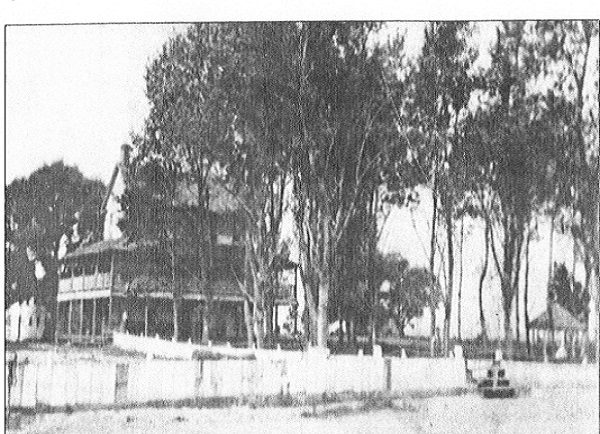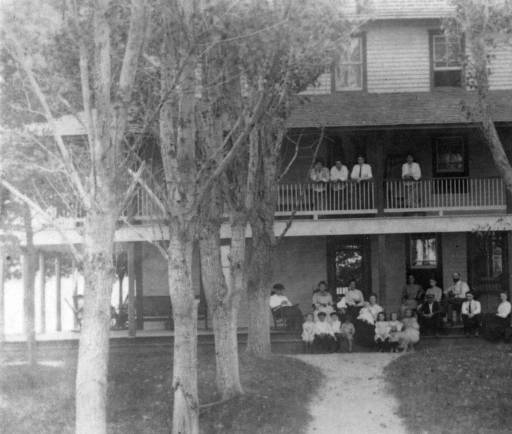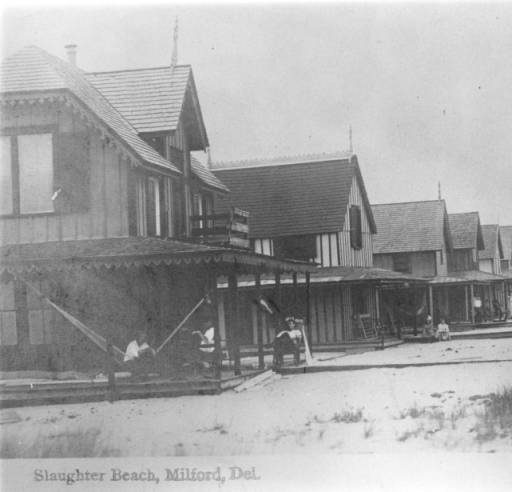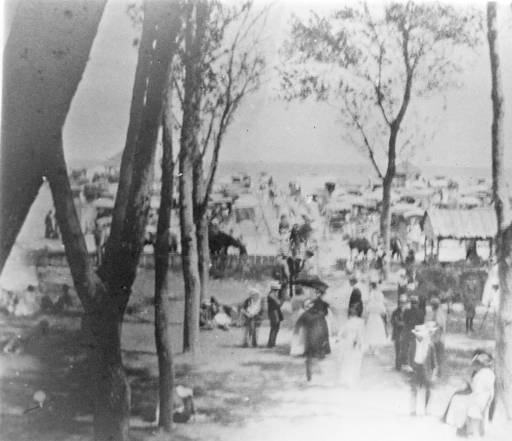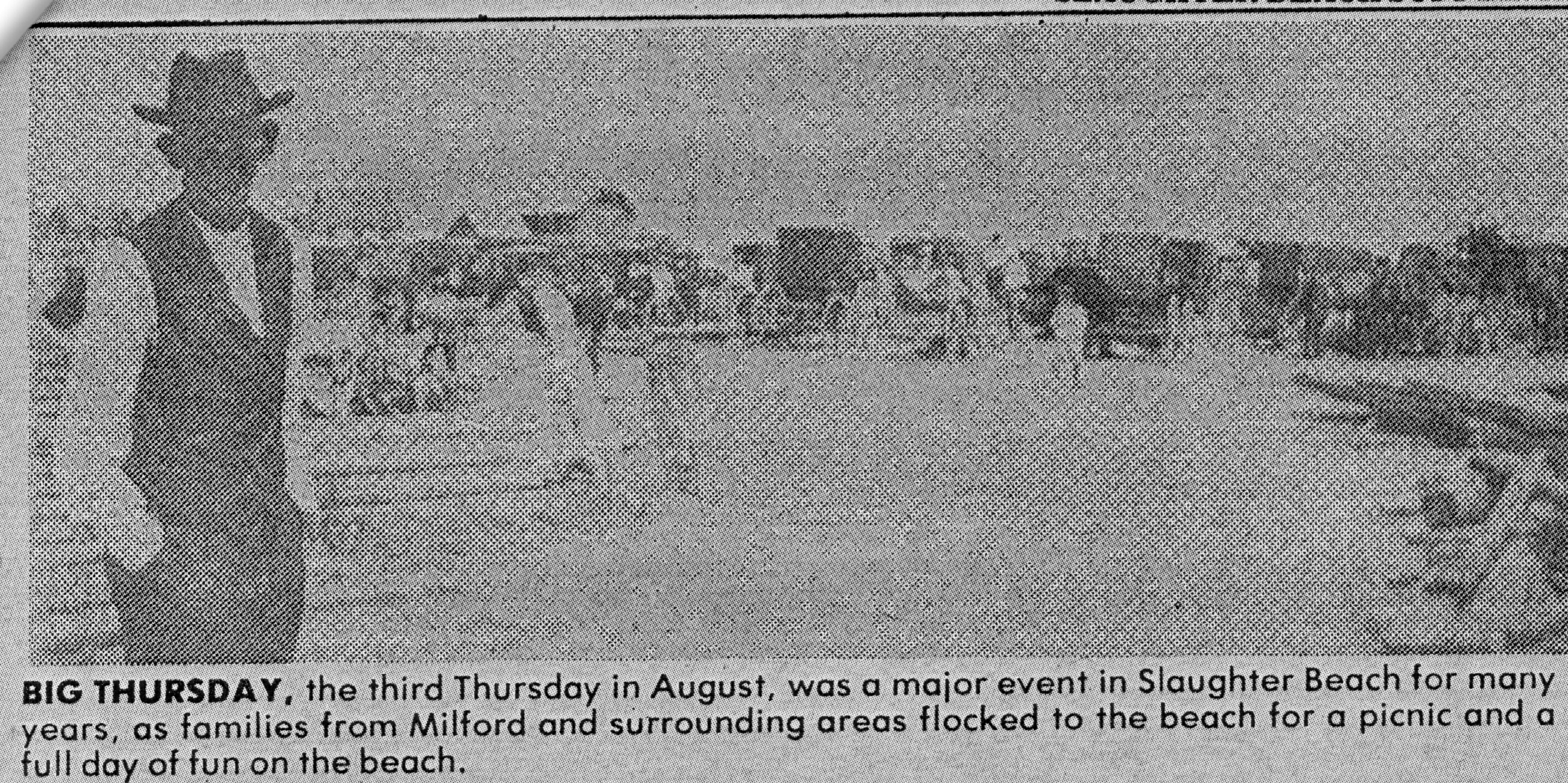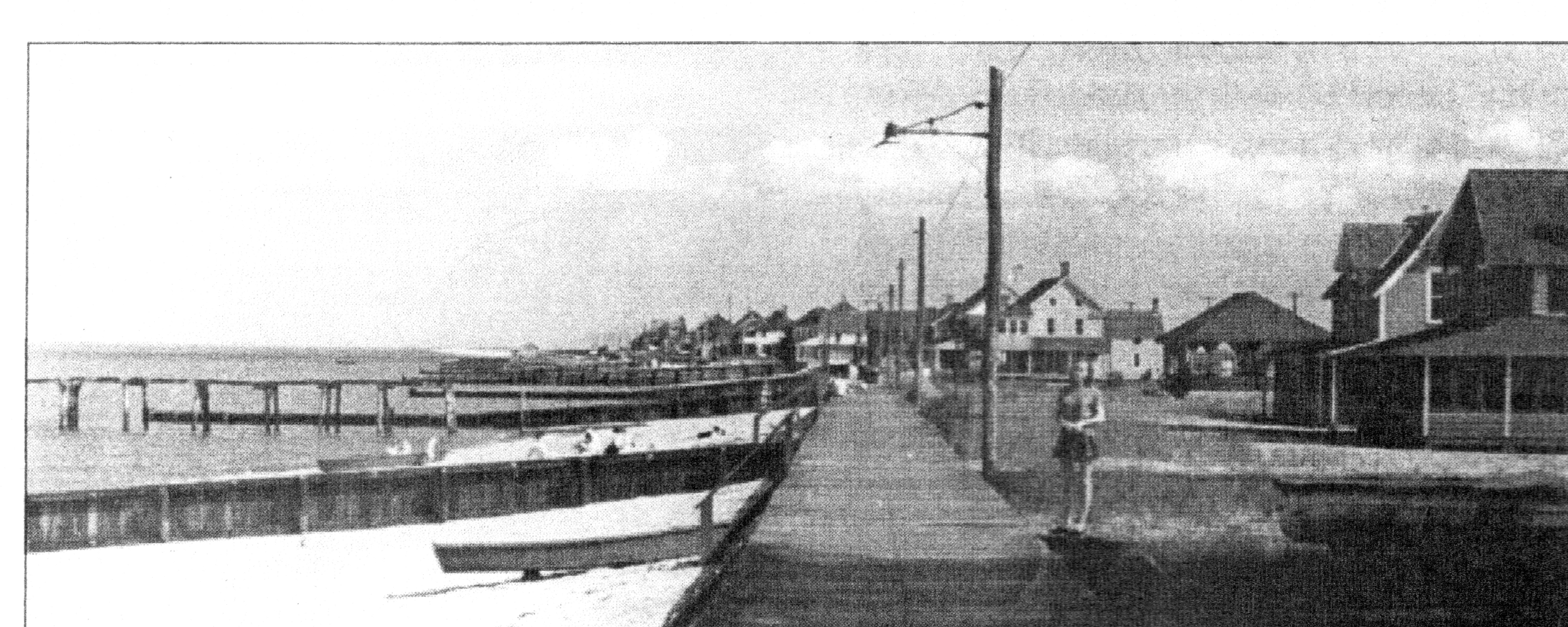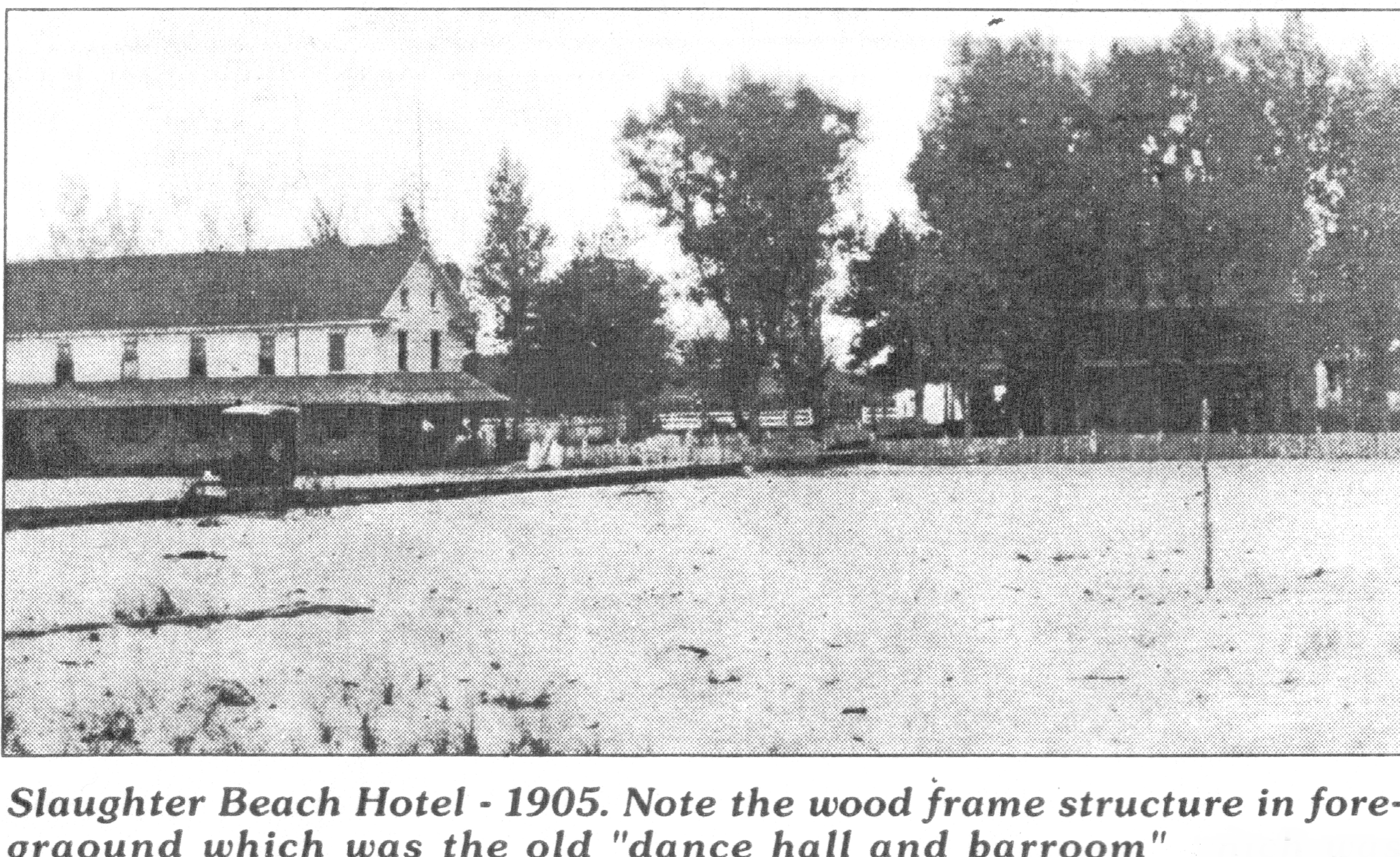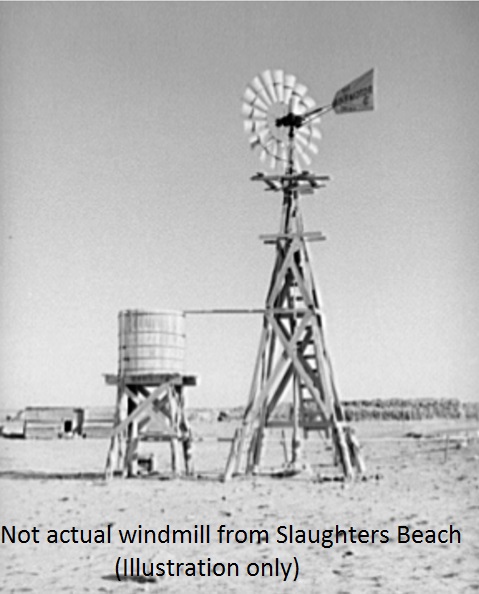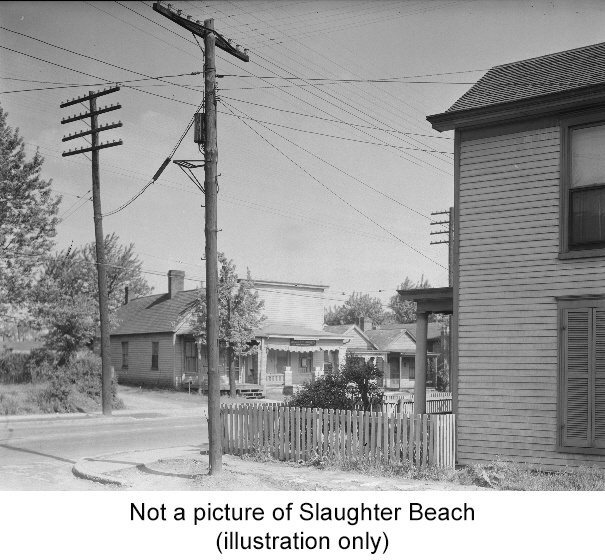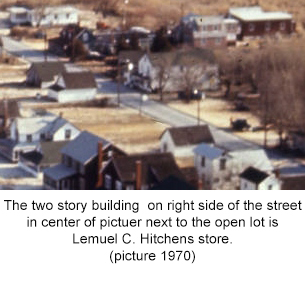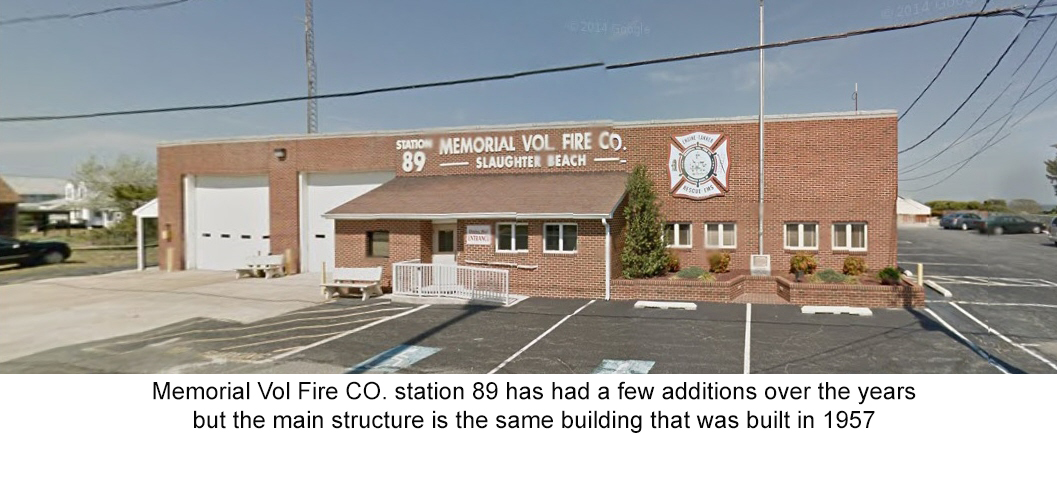| The History Of Slaughter Beach |
| |
History of
slaughter beach can be traced back as far as 1664 when land
grants were given by the Duke of York (1664-1679) and William
Penn (1682-1715). The first permanent structruer built near the
beach was Thorne Point Hotel aslo know as Cedar Beach Hotel 1850
shown on the sussex county map done my Price & Rey 1850. It was
located in the area were cedar creek marina is today. It was
remodled in 1888 untill it burned down in 1932 |
|
| |
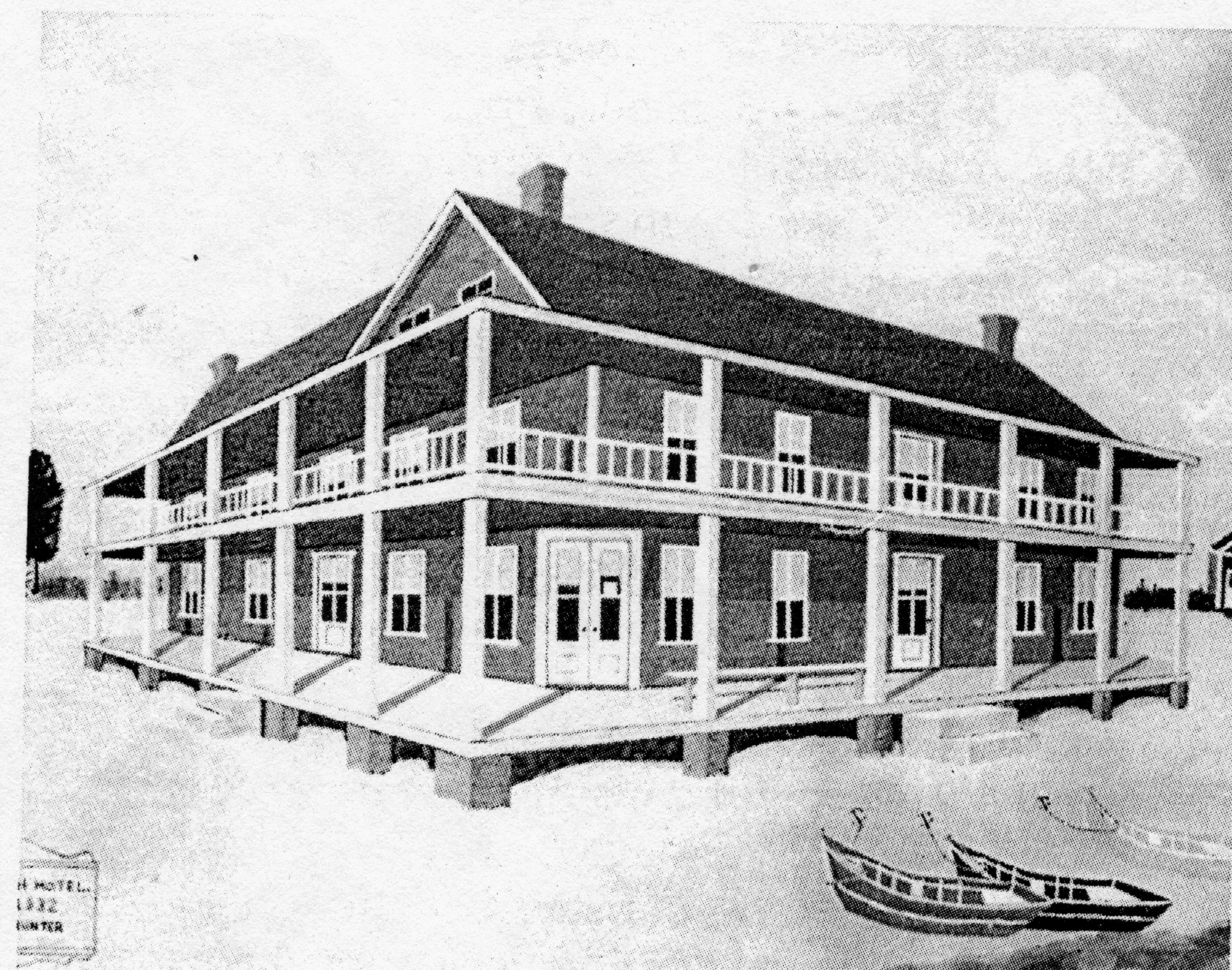 |
|
| |
The first permanent strucruer on the
beach was 1865 owned by Joseph G. Morgan. The first record of
the hotel at Slaughters beach was recorded on Beers Atlas
Published in 1868. When Morgan died October 8, 1871, without a
legal will, Sussex County Orphan's Court appointed five local
freeholders to divide his farm and holdings between his wife and
children. The Orphan's Court surveyed Morgan's farm and recorded
a plot in the court house dated May 13, 1872. The 145 acre
"Morgan" farm was divided into a 70 acre tract reserved for
Morgnas widow, Julia and a 69 1/2 acre parcel which was sold
July 6, 1872 at auction to Charles Todd for $1,635. The plot of
69 1/2 acres shows a frame hotel sitting on 16 acres of tillable
ground labeled Doctor's Island . This plot of land became know
as the Slaughters Beach Hotel Property, and it remained in
tacted during the nect 79 years of multiple sales. The parcel
ran 45 perches (742 feet) along the shore of the Delaware Bay
and then westward to the Slaughter Creek canal. It is not clear
why the 16 acres of high ground was called Doctor's Island, but
a reasonable assumtion is the hotel was built as a retreat for
visitors of substantial means who boarded for short periods at
the hotel built by Joseph G. Morgan along the Delaware Bay. On
September 29, 1876 Charels Todd sold the hotel property for
2,550 to a hotel keeper from Philadephia named Geroge W. Male it
was described in the deed as a tract in Slaughters Neck bounded
on the east by the Delaware bay, containing 69 1/2 acres and
having a hotel thereon. In the first editon of the Milford
Chronicle newspaper published October 4, 1878 an advertisement
was placed by George Male for the Willow Grove hotel, at
Slaughers Beach. The ad placed by George male states this hotel
has become so popular as a summer resort and has first class
accommodations. It should be noted that gunning and fishing are
touted which implies Slaughters Beach hotel was used by
waterfowlers in winter months as well as fishermen in summer.
This is one of the first published references to the name
Slaughters Beach after the 1868 map-makers called the location
Docotr's Island. In February 27, 1901 the hotel was sold again
at auction to Stanley Short for 1,800. Stanley Short keep it
till January 1, 1914 when it was sold to Frederick W. Grahn for
3,500 Grahn managed the hotel untill November 18, 1921 when he
transferd the property to I. Thomas Simpson and his brother John
Pierce Simpson. Thomas simpson sold it on June 1, 1922 to the
Slaughter Beach Corporation lead by George T. Reed, Geo Grier
and William Smith for 3.500. By deed George H. Draper Jr. became
the owner of the Slaughters Beach Hotel on July 20, 1944. The
Slaughters beach Hotel was still standing in 1962 when they had
the March Nor'easter also known as the Great March Storm of 1962
in March 6-8 1962. But was burned by the Slaughters Beach fire
Company during the cleanup in summer of 62. The old Slaughters
beach Hotel had stood for ninety seven years from 1865 to 1962. |
|
| |
The name Willow Grove hotel suggests
there were trees growing on the 16 acre high ground as early as
1878. Later photos of the hotel show numerous silver maple trees
growing along the front walkway leading to the bech |
|
| |
The first permanent cottage on
Slaughters Beach |
|
| |
The first referance to any permanent
structure on Slaughters Beach beside the hotel is an August 17,
1885 lease for Frank Rickards and S.N. Gary of Milford who
negotiated a 99-year lease from the hotel owner George W. Male,
for a lot which measured 100 feet in width and 175 feet in
length |
|
| |
The second
cottage in this pictuer is the 1885 lease for Frank Rickards and
S.N. Gary of Milford |
|
| |
By 1890 Slaughter Beach was becoming the
fashionable place to vacation during Big Thursday, saw Slaughter
Beach crowded with visitors escaping the dog days of August. |
|
| |
Boardwalk was distroyed by an ice storm
in November 1940 |
|
| |
The dance hall was built some time in
the late 1800's and ealry 1900's and was a big part of Big
Thursday and was a hot stop for the boys from Fort Saulsbury
(1918 1939). The original dance hall was divided in two sections
about 1922 and moved to the bay front to become beach cottages.
The new dance hall was built a few years later. It was destroyed
by fire in the late 1939 and was torn down some time in 1940. |
|
| |
The name Town of Slaughter Bech
is made official |
|
| |
On February 10, 1931 the Motion was made
to name Town of Slaughter Beach was approved. In March 1931 The
legislature approved the charter for the Town of Slaughters
Beach and the first town council was held on April 16, 1931 |
|
| |
Slaughter Beach gets a new
bridge |
|
| |
On February 10, 1931 the motion was made
to send a letter to Colonel Howell to propose a stationary
bridge to be eredcted and the old wodden bridge was replaced |
|
| |
Slauther Beach get's running
water |
|
| |
The first mention of runing water to the
cottages was in 1934 of a windmill device situated on a wooden
derrick tower that was most likely built in the early 1900's.
Located at the rear of the dance hall. For a short time a
gasoline generator was used to power a pump prior to full
electrfication in 1936. Today that site is very near a
cement-block building covering a water well and pump which
replaced the old windmill. |
|
| |
Slaughter Beach get's
electricity |
|
| |
In 1936 the commissioners voted to award
a 15-year contract for providing electicity to Slaughter Beach
to Laurence Houseman owner of lincoln-Ellendale Electirc Co. The
town paid $1,447 for poles and light fixtures. On ay 11, 1937 a
similar franchise was given to the Diamond State Telephone
Company for the installation and maintenance of telphone lines
for the town. |
|
| |
Slaughter Beach first store's |
|
| |
Two stores operated on the west side of
Bay Ave in the rear of the original seven cottages near the
present Fire Hall Pierce's store later Macklin's. The Pettyjohn
family operated a store from 1924 until 1935 when that store
burned and Roy Pettyjohn gave up the busniess. Lemuel C.
Hitchens ( AKA Scorchy) moved to Slaughers Beach in the spring
of 1930 from Felton. Scorchy sold groceries, bait & tackle, ice
and genreal merchandise. Scorchy operated the business till his
death March 2, 1968. The only other store to provide competition
to to Scorchy Hitchens was the Corner Cupboard sandwich shop and
general store which was opened in 1958 by Chuck and Pauline
Hammond of Milford. This store was located at the N.W.
intersection of Bay Ave. and Cr 224 leading to Argo's Corner and
Milfrd. The Hammonds discontinued the store in the 1960's and it
was remodled into a home. |
|
| |
Slaughter Beach gets its first
fire station |
|
| |
After the fire in Agust 1940 that burned
down the cottages of Dr. S.M.D. Marshell and Wallace Burn were
destroyed buy a fire started by the cook working in rear of the
Wallace Burn residence. In 1957 they built the firt fire house,
built on the vacant site were the cottages of Dr. S.M.D.
Marshell and Wallace had once stood. |
|
| |
Fire works at Slaughter Beach |
|
| |
The company and crowds have steadily
increased from the locals who attened the first fire works
display in 1964. Since that time the leval of sophistication of
the display has been raised significantly. Fire Company
personnel spends about 10,000 each summer on fireworks which are
displayed non-stop for 30 minutes. Only donations are accepted
and everyone gets his money's worth at this event. The event
attracts more then 5,000 people each year who lay blankets and
chairs on the beach well in advance of the 9:00 p.m. start of
the show. Tour boats from Mispillion Lighthouse have anchored
off-shore to view the diplay from the bay. As of 2010 they no
long have fireworks due to safty reasons from beach erosion. |
|
| |
Slaughter Beach get's a
restaurant |
|
| |
In 1971 William Passwates purchased the
Cedar Beach land it is the same area that the Cedar Beach Hotel
was on. He built a marina and layed out streets to the
Passwaters section of the Cedar Beach. In October 7, 1973 he
built and opened a seafod restaurant which stood on elevated
pilings and over looked the new area developed for the marina
until it was torn down in 1989 by new owners. Passwaters was
granted approval to rezone 9 acers of his land for commercial
use April 8, 1975 to accommodate boat slips and facilities for
99 campers. He dreged a small creek and installed bulkheadings
and slips for recreational boats between 1983 and his death
February 3, 1987, Bill Passwaters sold lots along Beach Plum
Drive and Passwaters drive. 1989 Barbara Passwaters sold about
28 acers of this property to Hickman Rowland and Carleton Young,
partners in the Delaware Bay Launch Service and plans were made
to construct a modern boat stack storage facility. The project
was completed and opned in 1989 with much fanfare. But the boat
stack project never lived up to expetations of its owners who
sold the facility to Marvin Kahl of Baltimmore in 1997,
operating as Cedar Creek Marina. |
|
| |
Slaughter Beach from 1980 to now |
|
| |
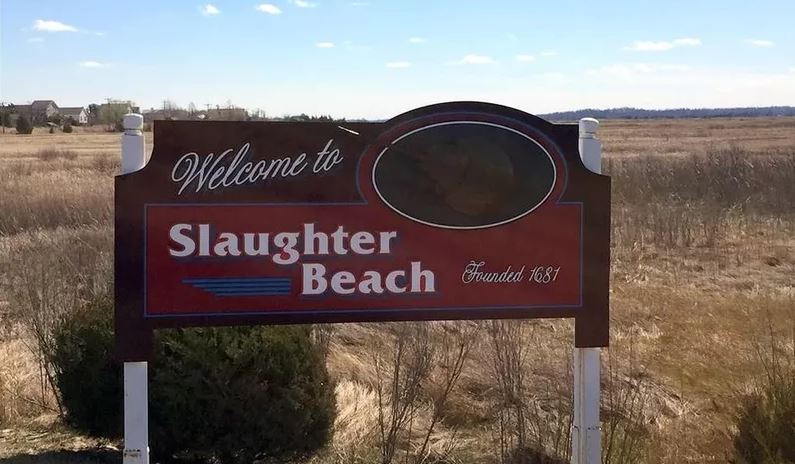 |
|
| |
From 1980 to the present Slaughter Beach
has seen a steady increase in residents locating permanently.
Many seek the quiet solitude and beautiful scenery the Delaware
Bay has to offer while others want the slower pace life the
beach offers. Rentals are still avaiable, but not at the leveal
seen between 1900 and 1970 when families regulary rented
cottages for several weeks of each summer. Today more families
stay year-round and rental cottages are in short supply. Today
upscale cottages are sprouting at such a rate that many fear
Slaughter Beach will soon lose its small town appeal. Many of
the old timers have passed away and no longer does anyone row
his boat to the corral beeds for a day of fishing. Trout fishing
isn't what it use to be and even the prevalent king crabs have
begun mating elsewhere. Changes are inevitable but Slaughter
Beach can point to a rich and colorful history to keep its
residents talking about the old days for many generations to
come. |
|
| |
Milford Historical Society and Dave
Kenton |
|
| |
Information was taken from the spring
1998 Vol. 36 |
|
| |
Milford Historical Society news letter |
|
| |
This web page was put togeather by the
Town of Slaughter Beach and Michael Davidson |
|
|

